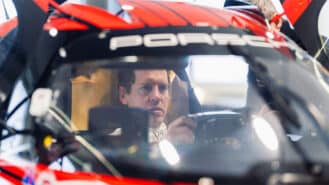
Only Tsunoda can save F1 in 2025: Japan GP – Going up, going down
In the face of soul-destroying boredom, only one driver can bring the entertainment needed to rescue a sport which resembles a broken AI tribute to itself
This was going to be a column about the ever more ludicrous car names manufacturers now feel forced to adopt because those that actually made any sense have long since been used and copyrighted. And a prime example to feature in this now postponed column was a small Suzuki hatchback that has just put on sale called Celerio.
But now while the Celerio still features this week, it is for reasons I would never have predicted. A few days ago a colleague was going through routine test procedures of a Celerio at the Millbrook Proving Ground which, when I used to look after testing for Autocar, I visited on an at least twice weekly basis. One such test is a simple emergency stop from 80mph, to simulate that gut-wrenching moment we’ve all experienced when we’re on the motorway and realise the car in front of us isn’t moving any more. The tester pressed the middle pedal and, in his words, ‘all stopping power was immediately lost.’ The pedal went to the floor and stayed there. Pulling it back up and depressing it again made no difference. Because these tests are all conducted with massive safety margins, a combination of the handbrake and engine braking brought the car safely to a halt.

That in itself would have been very alarming and would justify fully a complete investigation by Suzuki as to how the car got that way. But the properly scary aspect of this story is what happened next. To enable tests to be completed Suzuki replaced the Celerio with another car. Which suffered precisely the same total brake failure.
At such a time it is hard indeed not to sound like Lady Bracknell, for while one total brake failure could charitably be regarded as a freak that might reflect nothing more than an event in that particular car’s life prior to it being tested, for it to happen twice smacks of something far more concerning.
For myself and as someone who has tested a few thousand cars over the years, I find this astonishing. In that time I can remember all kinds of hilarious test track failures from all kinds of cars – indeed at Autocar we used during the year to compile a file called ‘What Went Wrong’ and publish its contents at Christmas – but never anything like this. I can remember a Saab 900 eating its own gearbox during a standing start acceleration run and a Jaguar XJS being completely immobilised by a sparrow I hit while driving at 140mph in thick fog on a closed section of track. There was a modified Ford Sierra Cosworth that spat cherry-sized chunks of rubber out its overheated tyres while trying for a maximum speed run on the banked track, and, more simply, the TVR V8S that was so unstable attempting to do the same I abandoned the test.
I remember too losing an entire prototype Aston Martin DB7 thanks to an exhaust becoming displaced due to the combination of a non-production bracket and the massive forces exerted by the banking above 160mph and setting fire to the back of the car. There was also the Daewoo Matiz that inverted itself when, if I recall correctly, one of my colleagues, for reasons unknown, reversed it as fast as it would go then yanked the wheel. But these mishaps all occurred with cars operating beyond their normal stress limits and in a way that could never be replicated by a normal customer on a public road. But do I recall complete brake failure? I remember brakes that have lost efficiency under brutal, prolonged fade testing and that they often smoked and sometimes caught fire. But a total, instantaneous loss of all braking ability during a straight-forward emergency stop? Not once.

It is surely shocking that this can happen in 2015. It would have been in 1988 when I first started this job and probably even in 1895 when the first issue of Autocar was printed. I have to be careful with what I say because I wasn’t there, but Suzuki has put out an official statement that in no way seeks to deny nor even shine less harsh light on what went on. Instead it has told all owners of Celerios in the UK and Ireland to stop driving them immediately until the cause of the failure can be traced. Under the circumstances, nothing less could have been contemplated.
Too often in the past – and often in America – cars have gained entirely unfair reputations for allegedly lethal failings that have turned out to be nothing more than operator error. Some 30 years after its ‘unintended acceleration’ episode in which it turned out to have been entirely innocent, Audi is still struggling to rebuild its reputation in the US. But it is hard to see, on the facts as given, that the brakes on a Suzuki Celerio did anything else but fail, and that those on another then did precisely the same thing.
One thing is certain: Suzuki will need to act quickly, decisively and with complete transparency if long-term damage to its reputation is not to be done both here and abroad.

In the face of soul-destroying boredom, only one driver can bring the entertainment needed to rescue a sport which resembles a broken AI tribute to itself

Waking up at 4am on a Sunday is rarely worth it, especially when Max Verstappen looks poised to take another lights out to chequered flag victory — as he did…

Should there be a new prize for a team finishing sixth in the championship – just like the Jim Clark Trophy in the good old turbo times?

Sebastian Vettel is set to test a Porsche 963 Hypercar, having already been linked with a Le Mans drive. But would his return really add that much to the world of racing?